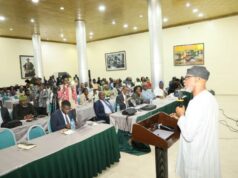Prof. Innocent Ujah, Director-General, Nigeria Institute of Medical Research (NIMR), Yaba, on Thursday called for collaborative efforts to end tuberculosis in the country.
Ujah made the call at a programme organised by the institute in Lagos to commemorate World Tuberculosis Day.
The day is marked every March 24 globally and the theme for 2016 is “Unite to End TB’’.
Ujah said that TB was most common among the underprivileged, vulnerable and poor people.
He said that TB, an airborne disease that can spread from person to person regardless of creed, gender or race, is usually referred to as a disease of poverty.
“TB is a preventable and curable disease. However, the disease remains one of the world’s most deadly infectious conditions.
“TB is among the leading causes of death worldwide, particularly in middle and low-income countries.
“Our efforts are focused on reducing TB (including multi-drug resistant TB), especially among the most vulnerable such as people living with HIV and children, through our TB diagnostic services.
“NIMR is also at the fore-front of TB research under the HIV/TB Research Group on drug surveillance, evaluation of new TB diagnostic tools and molecular studies on TB,” he said.
Ujah said that in addition to providing clinical service, the laboratory undertook various research activities in collaboration with the TB/HIV and Immunology Research Groups.
Also speaking, Dr Titi Sofola, the Chairman, TB/HIV Research Group in NIMR, urged all stakeholders in the health sector to renew their commitment toward ending the tuberculosis epidemic in Nigeria.
“Tuberculosis has remained a major public health problem of global concern for many decades.
“TB causes ill-health among millions of people each year; for example, 9.6 million in 2014, and also caused the death of nearly 1.5 million in that year.
“Africa carries the most severe burden while Nigeria remains one of the 22 countries with highest burden worldwide,” Sofola said.
She said there was remarkable progress in TB control but there were still some gaps.
“The way forward to end TB by 2035 has been clearly articulated by Stop TB and endorsed by the World Health Assembly in 2014.
“The underlying principles of the `End TB Strategy 2016-2035’ include stewardship and accountability, monitoring and communities.
“TB is curable and preventable and it should be highlighted that diagnosis and treatment are provided free of charge in public health facilities in Nigeria,” Sofola said.
In his remarks, Dr Abimbola Bowale, the Medical Director, Mainland Hospital, Yaba, said that effective control of tuberculosis should be at the primary healthcare level to curtail its prevalence.
, “The primary care level is not optimal at this point in time, but if we can get it right at this level, TB will be eradicated in our society,” Bowale said
According to him, health literacy is another major challenge in eradicating TB in the society.
“The public should have adequate insight into what is done in hospitals as well as the symptoms which call for immediate TB screening,” Bowale, who was represented by Dr Adesola Oluseyi said.









